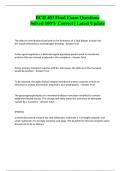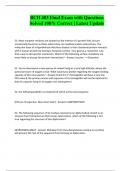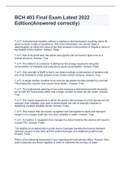Bch 403 final exam - Study guides, Class notes & Summaries
Looking for the best study guides, study notes and summaries about Bch 403 final exam? On this page you'll find 21 study documents about Bch 403 final exam.
Page 2 out of 21 results
Sort by
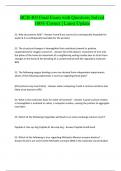
-
BCH 403 Final Exam with Questions Solved 100% Correct | Latest Update
- Exam (elaborations) • 23 pages • 2024
-
- $12.99
- + learn more
E1: Why do proteins fold? - Answer A and B are correct (It is entropically favorable for water & It is enthalpically favorable for the protein) E1: The structural changes in hemoglobin that contribute toward its positive cooperativity for oxygen consist of: - Answer All of the above ( movement of iron into the plane of the heme & movement of a neighboring veiling residue due to strain from changes in the heme & the breaking of a covalent bond with the regulatory molecule BPG
BCH 403 Final Exam Questions Solved 100% Correct | Latest Update
BCH 403 Final Exam with Questions Solved 100% Correct | Latest Update
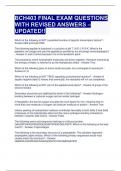
-
Bundle For BCH 403 FINAL TEST QUESTIONS WITH VERIFIED ANSWERS
- Package deal • 4 items • 2024
-
- $26.59
- + learn more
BCH 403 – CUMULATIVE TEST QUESTIONS WITH ALL CORRECT ANSWERS 2 Exam (elaborations) BCH 403 FINAL TEST QUESTIONS WITH VERIFIED ANSWERS 3 Exam (elaborations) BCH403 FINAL EXAM QUESTIONS WITH REVISED ANSWERS – UPDATED!! 4 Exam (elaborations) BCH403 PRACTICE TEST QUESTIONS WITH CERTIFIED ANSWERS
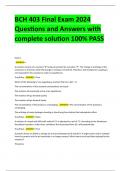
-
BCH 403 Final Exam 2024 Questions and Answers with complete solution 100% PASS
- Exam (elaborations) • 32 pages • 2024
-
- $15.99
- + learn more
BCH 403 Final Exam 2024 Questions and Answers with complete solution 100% PASSBCH 403 Final Exam 2024 Questions and Answers with complete solution 100% PASSBCH 403 Final Exam 2024 Questions and Answers with complete solution 100% PASS
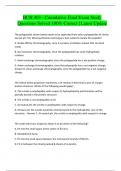
-
BCH 403 - Cumulative Final Exam Study Questions Solved 100% Correct | Latest Update
- Exam (elaborations) • 40 pages • 2024
-
- $13.49
- + learn more
The polypeptide shown below needs to be separated from other polypeptides of similar size (at pH 7.0). What purification technique is best suited to isolate this peptide? A. Nickel affinity chromatography, since it contains a histidine residue that can bind metal. B. Size exclusion chromatography, since the polypeptide has some hydrophobic residues. C. Anion exchange chromatography, since the polypeptide has a net positive charge. D. Anion exchange chromatography, since the polypeptide ha...
BCH 403 Final Exam Latest 2022 Edition(Answered correctly)
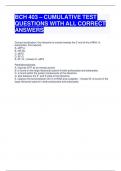
-
Bundle For BCH 403 FINAL TEST QUESTIONS WITH VERIFIED ANSWERS
- Package deal • 4 items • 2024
-
- $26.99
- + learn more
BCH403 PRACTICE TEST QUESTIONS WITH CERTIFIED ANSWERS 2 Exam (elaborations) BCH403 FINAL EXAM QUESTIONS WITH REVISED ANSWERS – UPDATED!! 3 Exam (elaborations) BCH 403 FINAL TEST QUESTIONS WITH VERIFIED ANSWERS 4 Exam (elaborations) BCH 403 – CUMULATIVE TEST QUESTIONS WITH ALL CORRECT ANSWERS

-
BCH 403 FINAL TEST QUESTIONS WITH VERIFIED ANSWERS
- Exam (elaborations) • 15 pages • 2024
-
Available in package deal
-
- $12.99
- + learn more
BCH 403 FINAL TEST QUESTIONS WITH VERIFIED ANSWERS Which one of the following proteins catalyzes the 5' --> 5' bond when adding the 5' cap to mRNA - Answer-RNA guanylyltransferase which one of the following mRNA sequences contain an arginine residue as the 4th amino acid in the reading frame 3? A codon table is located on the last page of this exam booklet - Answer-5' UUUGACCGACCAGAACCC 3' Which one of the following is not involved in translation initiation in prokaryotes? - Ans...
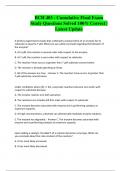
-
BCH 403 - Cumulative Final Exam Study Questions Solved 100% Correct | Latest Update
- Exam (elaborations) • 41 pages • 2024
-
- $13.99
- + learn more
C. I cannot make any conclusions about the rate constant with this information. D. It is definitely a first order rate constant. E. The catalyst is not very efficient. - Answer A. It has most likely increased. T/F: The thermodynamics of a biochemical reaction can be driven by either favorable changes in enthalpy or favorable changes in entropy, but not by both. - Answer False T/F: Hydrogen bonds are weak electrostatic interactions that are made possible by the presence of partial charges o...

How much did you already spend on Stuvia? Imagine there are plenty more of you out there paying for study notes, but this time YOU are the seller. Ka-ching! Discover all about earning on Stuvia

